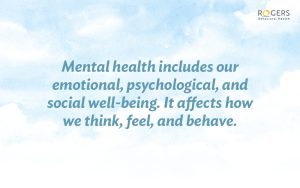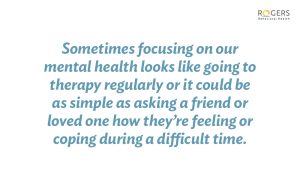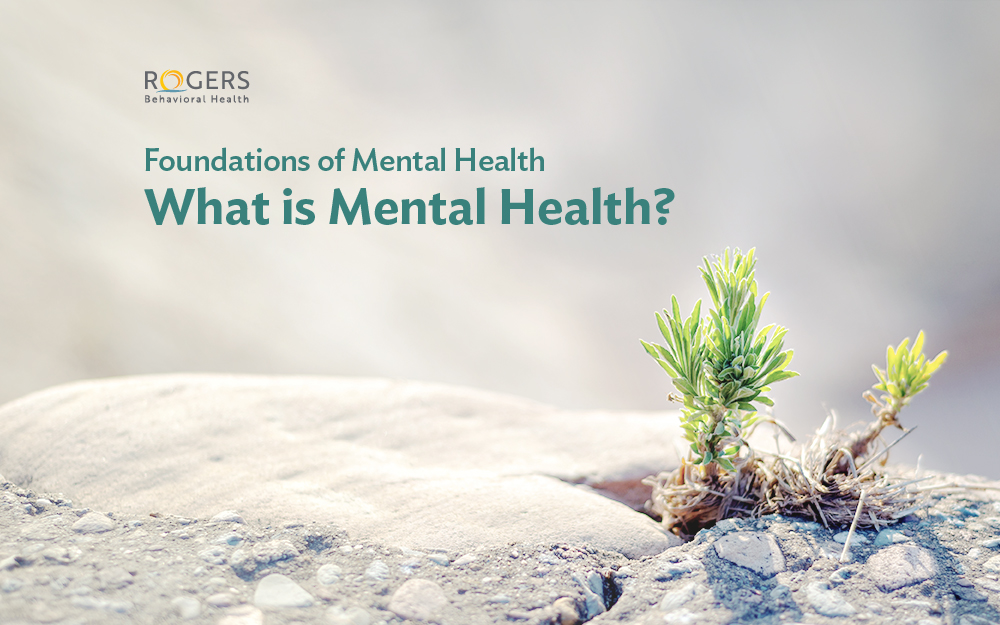Managing mental health, let alone mental health challenges, can feel hard, confusing, and lonely. We don’t want it to be.
Understanding it is very important for maintaining your overall health and well-being.
With that in mind, we created a six-part blog series, Foundations of Mental Health: A Beginner’s Guide. Our goal is for you to know:
- What is mental health?
- What is mental illness?
- When you should seek help and mental health treatment options
- How to talk about it
- How to support your friends and loved ones who may be struggling
- How to maintain and strengthen your own mental health
Whether you want to learn for yourself or for a loved one, this series will give you the knowledge and tools to handle mental health with confidence and compassion.
Rogers Behavioral Health’s Dr. Heather Jones, PhD, vice president of clinical services, kicks off our series explaining what mental health is and why it’s not selfish to focus on it.
Dr. Jones, can you explain what mental health is?
 It includes our emotional, psychological, and social well-being. It affects how we think, feel, and behave. I like to think about it as our brain’s well-being, impacting how we relate to and interact with others, and how we make choices.
It includes our emotional, psychological, and social well-being. It affects how we think, feel, and behave. I like to think about it as our brain’s well-being, impacting how we relate to and interact with others, and how we make choices.
Taking care of our mental health is just as important as managing our physical health. We exercise, go for a walk every day, and find time to get fresh air because we know that through physical activity we’re helping our bodies become resilient, less prone to illness. In the same way, by focusing on our mental wellness through activities like mindfulness, meditation, or going to therapy regularly, we’re strengthening our emotional and mental well-being so that we can better manage the stresses of life.
When we’re not feeling well physically because we have a cold or we didn’t get a good night’s sleep, we know that impacts our ability to function. The same is true for our mental health. When we’re worried or feeling stressed, we’re also not able to be our best.
I like how psychologist Marsha Linehan, who is known for developing dialectical behavior therapy, talks about vulnerability factors. We all have a big bucket of things that are contributing to our successes and our challenges on a day-to-day basis. When we feel overwhelmed, haven’t slept well, or we haven’t been eating well, those factors contribute negatively to our ability to be resilient in the face of life stressors, like navigating a challenging relationship, or solving a work-related issue.
Dr. Jones, why are mental health issues on the rise?
In 2023, the Surgeon General issued an advisory on the epidemic of loneliness. It caught my attention because during the pandemic there was a lot of forced isolation. Additionally, with the infusion of more and more technology into our lives, it was a timely call to action to build awareness of how important social connection is in our lives. While technology has evolved rapidly and there is evidence around its positive impact, it’s also created some complexities in terms of our social relationships.
The use of, and overuse of, technology:
- Replaces personal engagement
- Monopolizes our attention
- Causes us to avoid things or check out
While there are certainly other factors contributing to the rise of mental health issues, it’s critical to continue to talk about mental wellness and proactively focus on our mental health.
Dr. Jones, is it selfish to focus on mental health?
 It isn’t selfish to focus on what helps us feel better and builds our resilience, whether that’s emotionally or physically. We need to continue to encourage each other about the importance of focusing on and talking about mental health. Sometimes focusing on our mental health looks like going to therapy regularly to build our emotional resilience. Or it could be as simple as asking a friend or loved one how they’re feeling or coping during a difficult time to welcome a conversation and create a safe space.
It isn’t selfish to focus on what helps us feel better and builds our resilience, whether that’s emotionally or physically. We need to continue to encourage each other about the importance of focusing on and talking about mental health. Sometimes focusing on our mental health looks like going to therapy regularly to build our emotional resilience. Or it could be as simple as asking a friend or loved one how they’re feeling or coping during a difficult time to welcome a conversation and create a safe space.
Rogers provides mental health and addiction services
Rogers provides compassionate mental health services and addiction services for children, teens, and adults in a growing number of communities across the country.
Next in Foundations of Mental Health: A Beginner’s Guide: What is mental illness and how to understand common mental health challenges.


